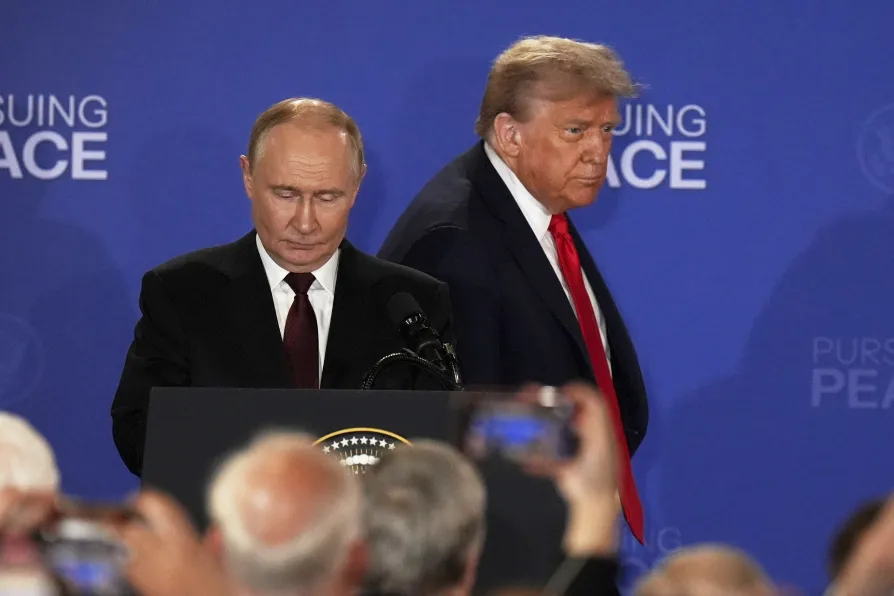
 President Donald Trump (right) Russia's President Vladimir Putin arrive for a joint press conference at Joint Base Elmendorf-Richardson, Alaska, August 15, 2025
President Donald Trump (right) Russia's President Vladimir Putin arrive for a joint press conference at Joint Base Elmendorf-Richardson, Alaska, August 15, 2025
THE outcome of the Alaska talks between Presidents Trump and Putin represents a positive, though still uncertain, step forward for peace.
Important provisional agreements were reached. The most important was the call for a peace conference to discuss terms for ending the war — not a ceasefire that would simply enable a replenishing of military forces.
There also appears to have been mutual recognition that any peace agreement must respect the rights of both Ukraine as a political entity and those of the Russian-speaking population of the four eastern provinces of Ukraine. For these provinces a transfer of sovereignty was needed.
Perhaps more tentatively in terms of agreement, but, as a key condition for any resolution, Ukraine itself must remain outside Nato — though with firm guarantees as to its security.
A very good start, it would seem. So why uncertain? Because there remain powerful forces in the West that would oppose any settlement. In the United States itself neoconservative lobbyists remain entrenched within both Democratic and Republican parties.
Their supremacist ideology sees, long-term, the defeat of China as an essential condition for global hegemony of the dollar and dominance elsewhere as a necessary preliminary. Within the Biden administration they were largely in control — being responsible for rejecting moves for mutual security guarantees made by Russia in 2021 as well as pushing forward the aggressive militarisation of the Pacific and challenging the formerly agreed status of Taiwan.
Today these force remain powerful within the US policy elite and the military. They have also left a dangerous legacy among policy-makers in Europe, particularly within the leadership of the European Union. Trump’s reconfiguration of Nato, making European countries responsible for defence costs, has also had at least one major negative consequence. It intensified the need for a European war narrative, one quickly endorsed by bankers and policy-makers struggling with stagnant economies. Shamefully our own Labour government played a prime role in this.
Hence over the last weekend we have seen virtually all sections of the press in Britain from the Guardian/Observer to the Telegraph and Times presenting the Anchorage agreement as at best flawed and at worst a betrayal.
Among some political leaders in Europe the past 24 hours have seen some shifts: acknowledgements that an “Article 5” type guarantee for Ukraine, but one also outside Nato, might suffice as a peace condition and that a peace conference might be the next step. But counterforces are gathering around Volodymyr Zelensky. The next week is therefore fraught with danger.
This is why peace movements in Britain must intensify their work on this front. They need to explain that the dollar supremacists who back continuing war in Europe also back, as a necessary complement, Israel’s expansionist and lethal policies in the Middle East. And, no less important, the world’s last agreement for the limitation of nuclear weapons expires in less than six months.
However, any response also requires more than just the exposure of the war narrative. It means spelling out what it means for the crisis of welfare, living standards and our country’s productive infrastructure. Keir Starmer has already committed Britain to doubling its military budget.
More immediately, over just the first three months of 2025 Britain provided over £3 billion military-related aid to Ukraine — more even than Germany — a level of spending that is currently due to continue.
Britain’s trade union and labour movement therefore has a duty to explain the consequences in practical detail both for their own members and the wider communities they service. The slogan “welfare not warfare” is an old one. Never before has it been more relevant.

Western nations’ increasingly aggressive stance is not prompted by any increase in security threats against these countries — rather, it is caused by a desire to bring about regime changes against governments that pose a threat to the hegemony of imperialism, writes PRABHAT PATNAIK

While 69 per cent of Ukrainians want negotiated peace, Western leaders are cynically prolonging the war for their own strategic and economic goals, to the immense detriment of Ukraine and Europe, write BOB ORAM and MAGGIE SIMPSON

Washington plays innocent bystander while pouring weapons and intelligence into Ukraine, just as it enables the Gaza genocide — but every US escalation leaves Ukraine weaker than the neutrality deal rejected in 2022, argue MEDEA BENJAMIN and NICOLAS JS DAVIES










